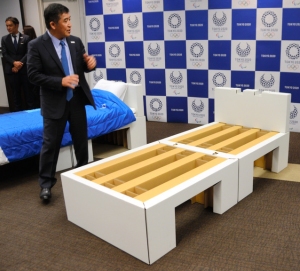This year’s Olympic athletes will be sleeping on cardboard beds, but they can still go for the gold between the sheets — as long as they don’t have threesomes, the mattress’ manufacturer says.
“We’ve conducted experiments, like dropping weights on top of the beds,” a rep for Airweave, which is making the recyclable beds for Tokyo’s Athletes Village, told Agence France-Presse.
“As long as they stick to just two people in the bed, [the sleepers] should be strong enough to support the load.”
Olympic officials first unveiled the 2020 Games’ cardboard sleepers Thursday, claiming they are “stronger than wooden beds.”
But news of the eco-friendly sleeping alternative was met with skepticism from some athletes headed for the Village, which is famous for its sex-friendly set-up, including free condoms.
The recyclable beds are a “great gesture . . . until the athletes finish their said events and the 1000’s of condoms handed out all over the village are put to use,” tweeted Australian basketball player Andrew Bogut, who formerly played for the Golden State Warriors.
The manufacturer claimed Friday that its beds can withstand about 400 pounds.
Around 18,000 of the beds will be constructed in 21 apartment towers alongside Tokyo Bay in preparation for the Olympic and Paralympic athletes.
The bed frames will be recycled into paper products after the events, while the mattress components, which are not made of cardboard, will be turned into plastic products, officials said.
The 2020 Games will mark the first times that Olympic beds and bedding will be made of renewable materials. Tokyo’s Athlete Village is set to be completed in June ahead of the start of the Olympics on July 24, followed by opening of the Paralympics on Aug. 25.
Athletes Village is notorious as a hotbed for hookups, with huge numbers of condoms reportedly doled out to competitors at every games.
The 2018 Winter Games in Pyeongchang, South Korea, handed out a total of 110,000 rubbers — resulting in a whopping 37.6 condoms per athlete for the 16-day stay, the South China Morning Post reported.
But the 2016 Summer Games in Rio De Janeiro, Brazil — which hosted more than 10,500 athletes — took home the gold for the record number of condoms.
Rubbermakers at the time said they handed out free 450,000 prophylactics — or 42 per athlete — from an Athletes Village clinic and at vending machines.
New York Post
